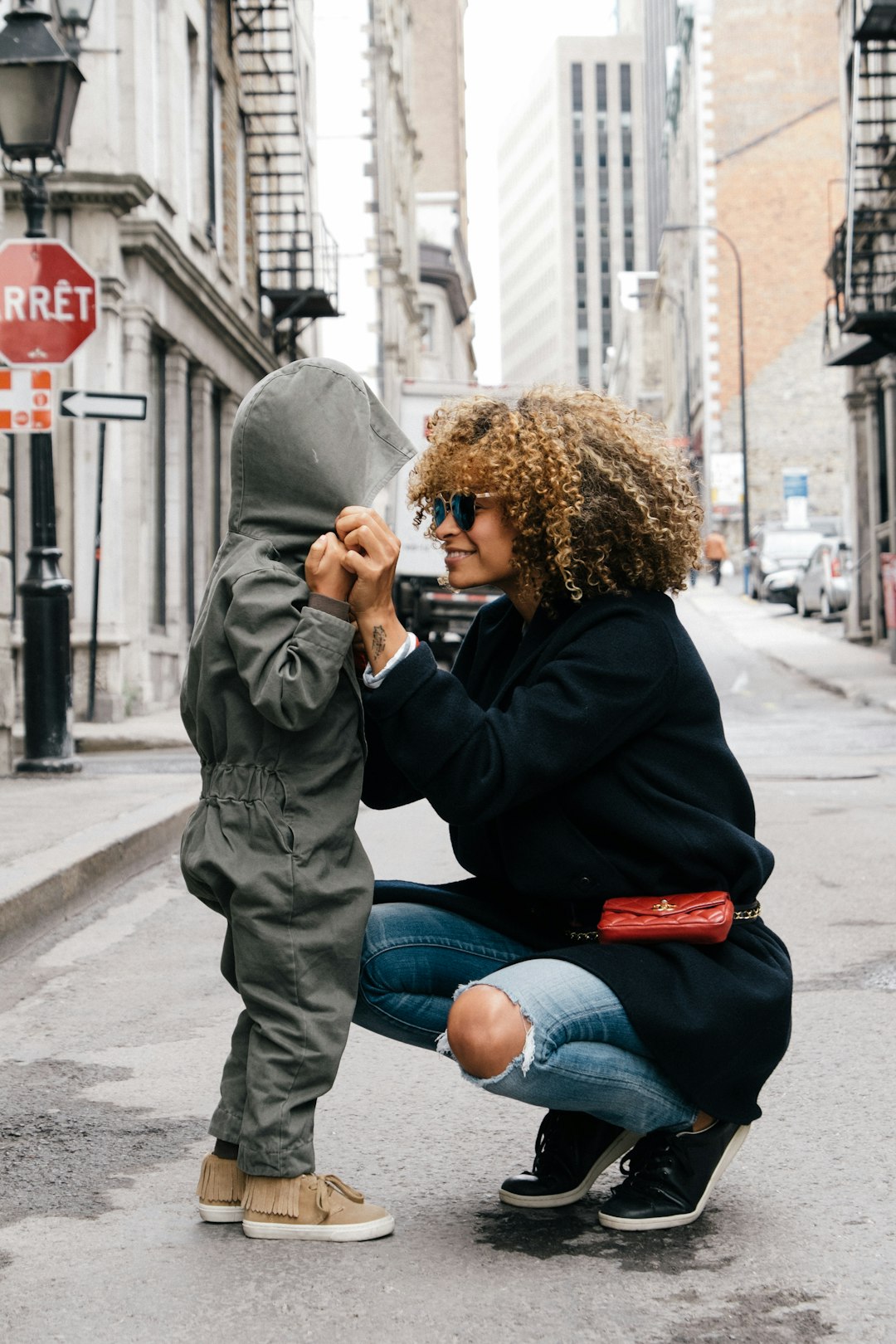
First, some defining
We looked a little at the origin of the word ‘parent’ last week. Now let’s look at ‘mother’ for those of you who enjoy this kind of thing:
mother (n.)
"female parent, a woman in relation to her child," Middle English moder, from Old English modor, from Proto-Germanic *mōdēr (source also of Old Saxon modar, Old Frisian moder, Old Norse moðir, Danish moder, Dutch moeder, Old High German muoter, German Mutter), from PIE *mater- "mother" (source also of Latin māter, Old Irish mathir, Lithuanian motė, Sanskrit matar-, Greek mētēr, Old Church Slavonic mati), "[b]ased ultimately on the baby-talk form *mā- (2); with the kinship term suffix *-ter-" [Watkins]. Spelling with -th- dates from early 16c., though that pronunciation is probably older (see father (n.)).
Sense of "that which has given birth to anything" is from late Old English; as a familiar term of address to an elderly woman, especially of the lower class, by c. 1200.
Mother Nature as a personification is attested from c. 1600; mother earth as an expression of the earth as the giver of life is from 1580s. Mother tongue "one's native language" is attested from late 14c. Mother country "a country in relation to its colonies" is from 1580s. Mother-love "such affection as is shown by a mother" is by 1854. Mother-wit "native wit, common sense" is from mid-15c.
Did you notice how the word is similar in Sanskrit, Irish, and Lithuanian? Wow. This article in The Atlantic explains “Why ‘Mom’ and ‘Dad’ Sound So Similar in So Many Languages.” Babbel gets to the point a bit faster, explaining that although variations of mom/mother are of the 23 oldest in the world, there is also something else going on:
But here’s a slightly less complicated (and way cuter) explanation: the word “mother” didn’t arise randomly in the human lexicon. It’s actually just the outgrowth of the way all babies learn to talk.
In his groundbreaking paper “Why ‘Mama’ and ‘Papa’?,” linguist Roman Jakobson pointed to the first syllable babies are usually capable of making: “ah,” or “mah.” These are usually the first sounds babies reach for because they don’t require complex mouth positions (or the use of tongue or teeth).
So, the same is true for dad, which we’ll look at next.
Beyond the idea of a ‘female parent’ (with many ways to interpret parent that we discussed last week), many connotations of the word mother exist, also in the verb form (great explanation linked). Sometimes it’s positive: I feel so much better; thanks for mothering me. Other times negative: stop mothering me, implying the person (‘mother’ or not) is perhaps too controlling or pampering or too involved with the speaking person’s decisions.
In these situations, my own son says to me, ‘You’re stressing me out!’ He’s four. Sigh.
Mother-writers
This coming week, I’ll be talking with writer and literary researcher Kate Jones from A Narrative Of Their Own about mother-writers, including her own role as a mother-writer on the podcast. Although her work mainly focuses on modernist 20th century female writers (à la Virginia Woolf, hence the title), she makes natural comparisons to today’s society and the role of female writers, especially but not only, within it.
In the article linked here, Kate discusses authors such as Louisa May Alcott, Margaret Atwood, and Sylvia Plath as well as ideas and the language surrounding childlessness (which we’ll explore here next month). She also includes a poignant Jacinda Ardern / Boris Johnson comparison.
There’s been a whole thing about whether or not writers should have kids (here, compiled in LitHub), often comparing books produced to babies. (I don’t like this comparison!) There’s also been a narrative about ‘having just one kid’ if you want to be a writer popularized by Lauren Sandler and originally published as an article in The Atlantic. Really, of course, it depends on so much. While Louisa May Alcott in 19th century Massachusetts would have had few options to publish her writing and have a child, or even husband, there may be more options to women (and other parents) today. However, these options might depend on money, spousal or family support, culture, and other factors.
Pulitzer Prize winner Jane Smiley responded as such to the Sandler article:
I have three children of my own and two stepchildren. The key is not having one child, it is living in a place where there is excellent daycare and a social world that allows fathers to have the time and the motivation to fully share in raising kids.
And Zadie Smith had a long, compelling comment that sparked several follow up articles and interviews:
I am Zadie Smith, another writer. I have two children. Dickens had ten — I think Tolstoy did, too. Did anyone for one moment worry that those men were becoming too father-ish to be writer-esque? Does the fact that Heidi Julavitz, Nikita Lalwani, Nicole Krauss, Jhumpa Lahiri, Vendela Vida, Curtis Sittenfeld, Marilynne Robinson, Toni Morrison and so on and so forth (i could really go on all day with that list) have multiple children make them lesser writers? Are four children a problem for the writer Michael Chabon — or just for his wife the writer Ayelet Waldman? The idea that motherhood is inherently somehow a threat to creativity is just absurd. What IS a threat to all women’s freedoms is the issue of time, which is the same problem whether you are a writer, factory worker or nurse. We need decent public daycare services, partners who do their share, affordable childcare and/or a supportive community of friends and family. As for the issue of singles versus multiples verses none at all, each to their own! But as the parent of multiples I can assure Ms Sandler that two kids entertaining each other in one room gives their mother in another room a surprising amount of free time she would not have otherwise.
Well then. I posit that Smith’s reply is hard to argue with. Maybe that’s just because it resonates with me (although I ‘only’ have one kid…back to this ‘only’ thing in a sec).
In America at least, and definitely Switzerland as well, there is a huge daycare problem in that it’s massively expensive. I know lots of women and several men who stopped working simply because the daycare bill for more than one child became as much if not more than their salaries. A lot of them were happy for a change or to have more time with their children, but the reality doesn’t give a lot of choice. And for parents with lower incomes or single parent homes, the reality is obviously much worse.
Austria, however, where we lived until my son was almost two, had free daycare as well as very inexpensive daycare ($150/month) should you need longer hours or want a private company with a particular pedagogy or language, since they were also subsidized by the government. That’s what 50% tax on middle class salaries can get you if it’s well managed! But, this reality also doesn’t mean that gender parity is perfect in Austria either.
What we talk about when we talk about mothering
The other thing about this whole conflict that arose from the Sandler article is the only child debate. I have one child and people ask me why all the time. Even if it is the most common type of household in Europe and a great part of the world. Even if research has proven that onlies are fine. (“No one, [researcher Toni] Falbo says, has published research that can demonstrate any truth behind the stereotype of the only child as lonely, selfish and maladjusted. (She has spoken those three words so many times in the past 35 years that they run together as one: lonelyselfishmaladjusted.)”) Certainly nobody quotes the writers who say it’s the best thing for my career. Ha! Some people express concern or pity, confusion or disappointment.
Sometimes I think people have two children so that others stop asking questions, because the questions do. not. stop. But maybe with two, you get the opposite: people don’t ask if this is what you wanted. If something has happened. They think it’s exactly what was planned. And from what I’ve witnessed, the assumptions or questions they receive are probably as frequent, just differently posed.
The amount of questions and shaming that go on, often because people are just projecting their own insecurities and fears, surprises me. We’ll take a closer look at this notion with childlessness soon (I experienced some of these questions until I was thirty-eight). But, man, shouldn’t we just let people do what they want, as long as they’re not hurting anybody? And, shouldn’t we be careful not to judge when we have no idea what went into decisions or luck when it came to having kids or not?
But at the same time, if the relationship and timing is right, it’s great that people do talk about both choices and what someone may have gone through. It’s becoming slowly more acceptable, for example, to talk about things like miscarriages and abortions as well as fertility treatments and postpartum mental health issues or what it’s like to be a stepmom. With talking, people can relate, sometimes start to heal, sometimes find solutions, and basically share their experiences with someone else in a caring way.
Some novels I’ve read in the last few years seem more open to these dialogues. Later, I’ll mention a few that are more open about not having children. Here are some of them:
Love in Five Acts, by Daniela Krien
I Love You but I’ve Chosen Darkness, Claire Vaye Watkins
No One is Talking About This, by Patricia Lockwood (also about childlessness)
Dept. of Speculation, by Jenny Offill
Selfies of motherhood
I took a bunch of selfies when I first became a mom. Like, a lot of selfies. These were all taken merely with the intention of capturing a moment for myself. I had a premonition that I would need to look back on this time, perhaps because I may need to resignify parts of it or because I was afraid the fatigue would make me forget so much of it.
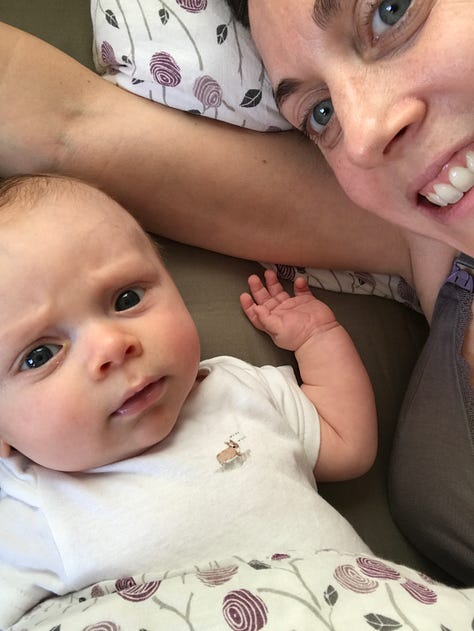
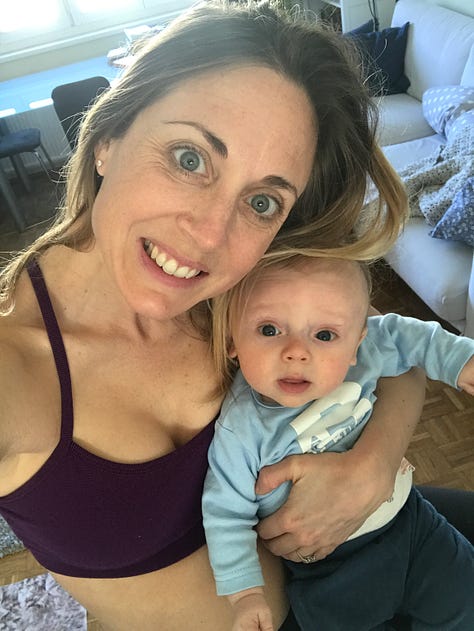
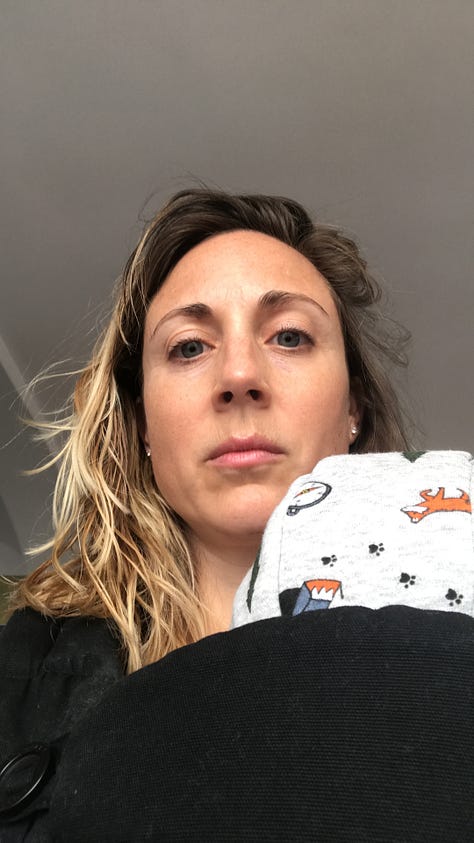
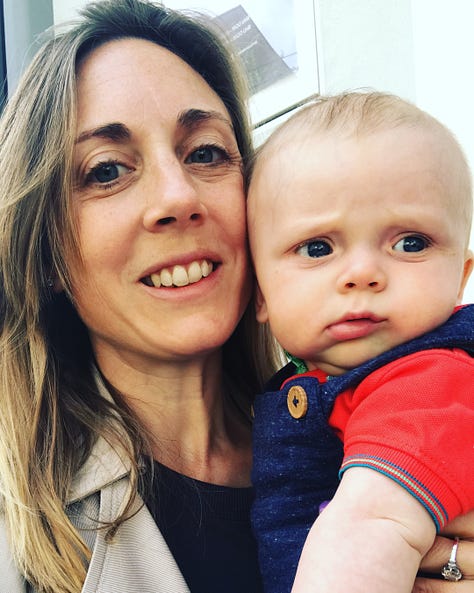
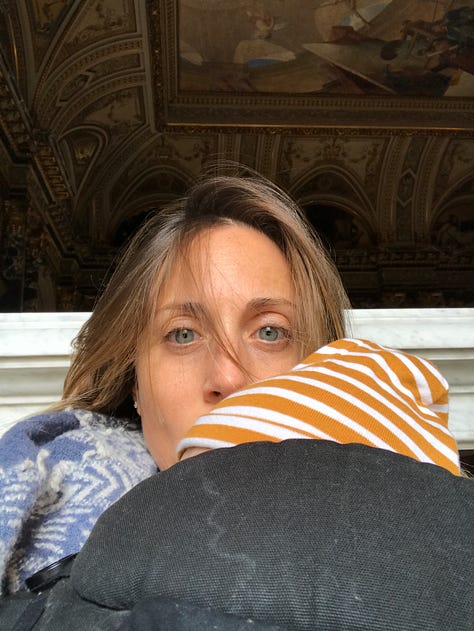
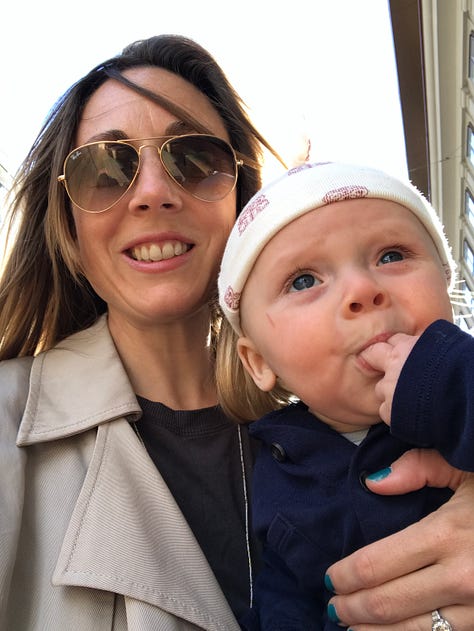
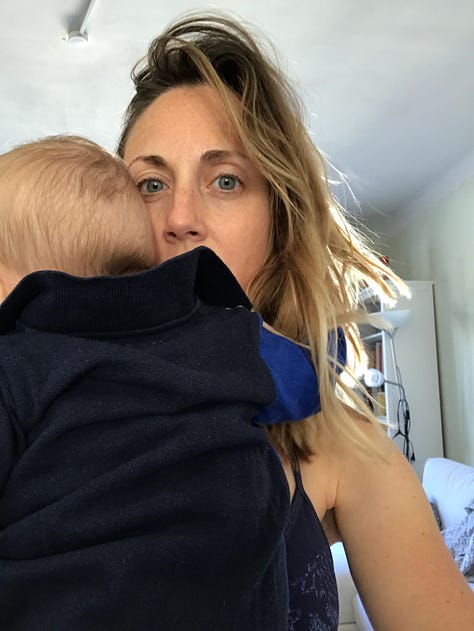
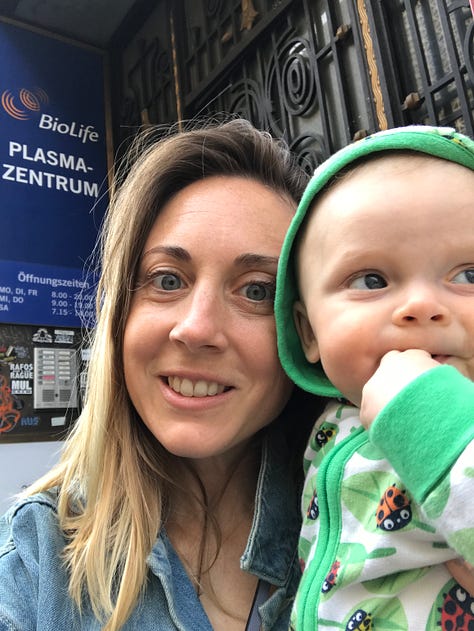

What’s funny is that I remember taking a lot more photos that look a little like the bottom right (exhausted…confused…alone…), but when I go back to search these are hard to find. In fact, there are many, many more that show the ‘glow of motherhood’ I wasn’t always aware that I had. There are hundreds…and I don’t dare delete them, especially the less flattering ones. There are selfies of me with my eyes closed as if sleeping taken perhaps as wishful thinking or provide some kind of evidence that indeed I needed rest (I’m not sure whom I could appeal to besides my husband who was just as tired as I was). There were many days I was so tired that I felt like I was barely alive whilst awake. It felt dangerous to go out in public, as if I would make a mistake, let go of the carriage handle or say something odd to a stranger.
From a journal reflection:
An old friend, a fellow pole vaulter, from college wrote a comment on my most recent Instagram post: I love your posts — I can pretend I live in Europe as a writer! And then I realized: this is what I am. This is what I’ve made myself. I live in Europe. I am a writer. I am free.
And this comment comes five months after my son’s birth. I am still a writer. I am even more of a writer than I was a year ago. Am I still free?
Of course I am. I’m also lucky: many people are not free because of the places they live or situations they are in (mothers or not). But despite the added responsibilities, I am free. People add responsibilities of many kinds into their lives at different times, whether having children or caring for a family member or friend or taking on extra work or having the burden of ill health. My added responsibility is insanely exhausting but also extremely rewarding and, ultimately, in my case, a choice.
What does art teach us about supporting a life? What does parenting teach us about art?
Athlete moms
The parts of my identity most linked to gender are: athlete and parent. Maybe this is more about how other people see me. Maybe this is also more about sex, that is biological rather than constructed by society, since both elements are physical (because I am the birth mother). It’s the areas I’ve felt the challenges of being a woman and the judgment of others within that gender role and sex as well as the areas in my life that I’ve been ‘divided by gender,’ but these have also been places to (positively) assert my gender identity as such.
I discussed the plight of the powerful Allyson Felix in her maternity struggles in The Art of Running last year. Here’s the excerpt from my article:
While receiving support from both the USATF and Nike in the past, Felix was not guaranteed a salary with Nike after announcing she was pregnant in 2018 (she has since gone on to win both Olympic and World Championship medals after having her child, only While receiving support from both the USATF and Nike in the past, Felix was not guaranteed a salary with Nike after announcing she was pregnant in 2018 (she has since gone on to win both Olympic and World Championship medals after having her child, only retiring just this past summer). Felix was rightly outraged and used her voice as power, publishing an Op-Ed with the New York Times: My Own Pregnancy Story, which the subtitle: “I’ve been one of Nike’s most widely marketed athletes. If I can’t secure maternity protections, who can?” (A video version is available here, featuring her own voice as well as a montage of a few others.) She discusses not just getting the respect and care she deserves but also helping those coming after her, especially African American women at greater risk for complications.
She and several other athletes essentially forced Nike to change their policy by going public and being supported by the media to do so. Additionally, because we are in the age of social media, Felix has been able to control her narrative. Now, she has her own brand of running shoes designed for women: Saysh. The shoes may be a kind of text all their own.
Here are a few other articles related to the topic:
Allyson Felix, Alex Morgan and other athlete mothers changing the game
They are Olympians. They are mothers. And they no longer have to choose.
Meet the Women Who Are Changing What it Means to be a Mom and a Professional Athlete
Podcast - Dame Jessica Ennis-Hill on The Midpoint (recommended by our podcast guest next week)
Advice on the internet
I mostly hate parenting advice on the internet. But at the same time, it can totally save your ass. Like anything, you have to be discerning of course. Is it backed up by research? Does the advice make common sense? Does it make you feel better about yourself or worse?
To give you an idea of the kinds of things I actually do look at in terms of parenting advice, here’s a really quick take:
When I was pregnant, I always looked up the size of the comparable fruit that my fetus was. I found it rather humorous.
I once looked up sleep advice for babies, found about 72 contrasting ideas, and vowed to never look for it again. Same for ‘baby led weening.’ Same for ‘kiddy nose picking.’
I love these two Instagramers below, and I think this is the only ‘parenting advice’ that I look at these days unless say there’s sickness and then OF COURSE I’m all over Web MD, the NHS, and the Mayo Clinic. But that’s not really parenting advice, just good old fashioned googling medical advice (and of course we go to the real doctor as needed! I’m mostly kidding…). Anyway, here are the IG people — the first one is both super funny and poignant, from a parent whose child went through cancer and sparked her to start videoing herself during the pandemic; the second is a therapist and shares her own ‘mom struggles’ in a really open yet supportive way:
And today, I’m going to leave it at that. But we’ll come back to these ideas later on. Tell us about your own ideas of artistry and ‘mothering.’ Or your favorite films and books that deal with the topic.
Thank you for reading The Matterhorn today!







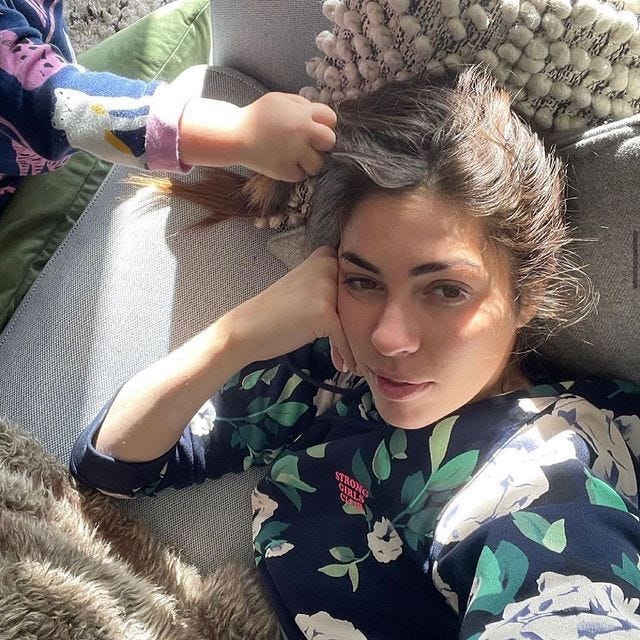

I really enjoyed this, and all the questions you raise. Whatever decision a woman takes about whether to have children, and how many, she will feel social pressure to justify it. We all have that in common, no matter what we decide. The decision is personal, and hard as this is, I don't believe that anyone else should influence it. If you have a life partner and you cannot agree on this matter, you might have to have a parting of the ways, since both of you have the right to decide. My personal view is that deciding whether to bring another human into the world, and whether you are the right person to do it, is complicated, and should not be taken lightly. Women should not feel that they must respond to external pressures, or entertain impertinent questions or interference on the matter. I think part of the interference is what I believe is now termed FOMO: in this case, trying to validate one's own decisions by questioning those of others. We should just make our own choices and let others do the same. I feel strongly about our freedoms, and I think that on this particular issue, we would benefit from saying "tell it to the hand" a bit more!
What a great piece of writing.